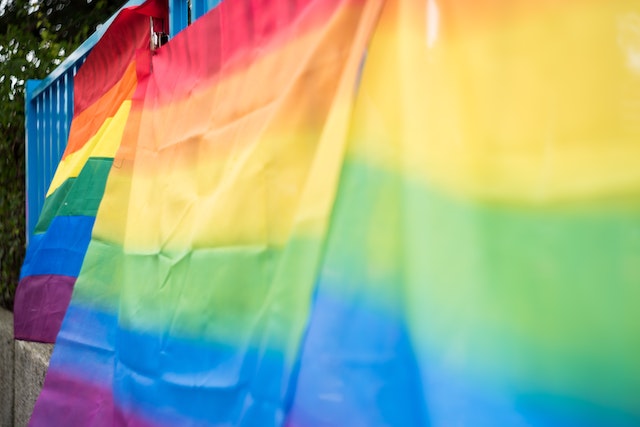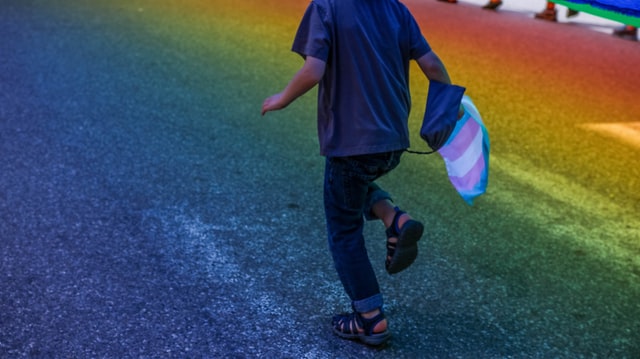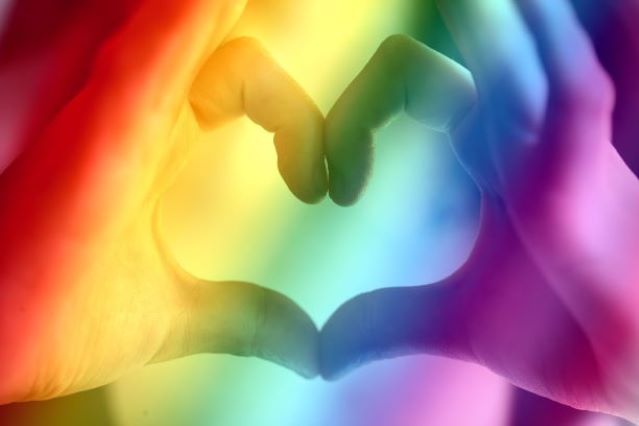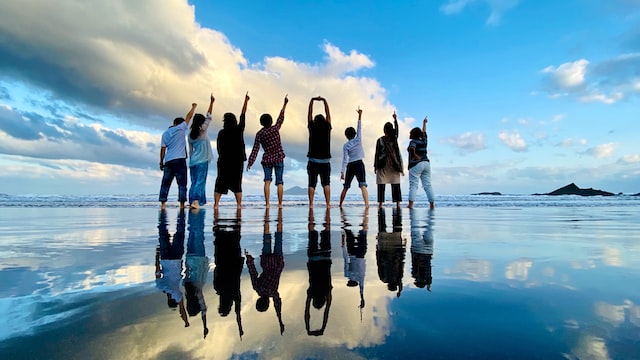New Rainbow resources, training, research and projects; Rainbow Family Violence Awareness Day
Mon 15 May 2023
New resources focus on supporting professionals who work with Rainbow communities in relation to sexual and family violence, and also for parents of Rainbow rangatahi. The Rainbow Violence Prevention Network is also hosting a webinar panel to mark Rainbow Family Violence Awareness Day.

New resources, training, research and projects
Rainbow Violence Prevention Network campaign and projects
The Rainbow Violence Prevention Network (RVPN) Aotearoa New Zealand is hosting a panel discussion on preventing family violence towards Rainbow people in Aotearoa on 29 May to mark the international Rainbow Family Violence Awareness Day. The awareness day started in 2020 in Australia, and is now a global event.
Inspired by the awareness day, the RVPN developed the This Is Us campaign. The This Is Us campaign aims "...to activate rainbow communities, allies and people working in the violence prevention space to take action to support rainbow communities to live free from violence." The RVPN webinar from March 2023 on preventing violence against Rainbow people included an overview of the campaign. A recording of the webinar is available.
To support the campaign, the RVPN has many resources on their website including posters and information sheets. The resources cover the topics of:
- Working with Rainbow Communities
- Rainbow Relationship Resources
- Posters to support the campaign including positive messages, bystander intervention, respectful Rainbow relationships, supporting Rainbow people with disabilities, supporting Rainbow elders and more.
The webinar also highlighted projects that RVPN network members have been working on, including:
- The Rainbow Competency Guidelines Project focused on developing best practice guidelines for primary prevention work with Rainbow communities
- Surveys and literature reviews exploring sexual violence and family violence support services for transgender and intersex people (the first report, Transgender Community Report: Seeking Help for Sexual Violence or Family Violence (2023), from one of the surveys is now available)
- a respectful relationships programme for Rainbow rangatahi.
The Rainbow Violence Prevention Network Aotearoa New Zealand is a national network of individuals and organisations working to address violence in and against rainbow communities including transgender, non-binary, intersex, takatāpui, indigenous and non-heterosexual identities. Network member Rainbow organisations include Inside Out, Outline, Rainbow Youth, Te Ngākau Kahukura, Intersex Aotearoa, Gender Minorities Aotearoa and Rainbow Path. Other network organisations include Help Auckland, RespectEd, Wellington Rape Crisis and Rape Prevention Education.
Sign up to stay up to date with news from the Rainbow Violence Prevention Network.
Online training for family and sexual violence specialists
The April 2023 Family Violence Sexual Violence Update from the Ministry of Social Development highlighted a new online training, Rainbow Safe, for family and sexual violence specialists working with Takatāpui and Rainbow communities. Rainbow Safe was developed by Hohou Te Rongo Kahukura | Outing Violence in collaboration with MEDSAC (Medical Sexual Assault Clinicians Aotearoa). The course is designed for kaimahi working in specialist services, as well as policy makers, service managers and people interested in understanding more about family, partner and sexual violence in Rainbow communities. Find more information about accessing the training from Hohou Te Rongo Kahukura.
New research about experiences of Rainbow young people
The Identify Survey is a study of more than 4700 Rainbow young people, ages 14-26, in Aotearoa New Zealand. The study asked young people questions about a range of areas including emotional wellbeing, home, school, work, community and family, friends and whānau. The Identify Survey Community and Advocacy Report (2022) shares key findings. It highlights that while many Rainbow young people report feeling safe or very safe in their current living situation, about 1 in 20 (5%) reported feeling unsafe or very unsafe and 1 in 5 (20%) reported they sometimes felt safe and sometimes unsafe. Disabled young people and young people who identified as trans and non-binary were less likely to feel safe or very safe, and Asian young people were significantly more likely to feel unsafe than any other ethnic group.
While many Rainbow young people reported positive experiences with their family and whānau, the research also found that "...A quarter of young people are missing out on parental support". Some recommendations from the report included:
- "Work with families and whānau to support young people can focus on both small and large things that they can do to show support
- Providing family/whanau whānau with easy-to-understand information about rainbow young people, the legitimacy of their identities, and the importance of using correct names and pronouns is an important opportunity to increase the proportion of young people who receive this important support
- Providing people with examples and guidance on how to safely stand up for rainbow young people is another important opportunity to improve young people’s safety and support"
The Youth Health and Wellbeing Survey called What About Me? (2022) also found that Rainbow and disabled young people were less likely to report feeling safe at work, school/kura, where they live and in the community where they live.
A number of research briefs and reports from Youth19 Rangatahi Smart Survey have also looked at experiences for Rainbow young people including safety:
- The health and wellbeing of takatāpui and rainbow young people who have been involved with Oranga Tamariki (2022)
- Negotiating multiple identities: intersecting identities among Māori, Pacific, Rainbow and disabled young people (2021) and the related Rainbow rangatahi Māori: a Youth19 brief, the Pacific Rainbow young people: a Youth19 brief, the Rainbow young people with a disability or chronic condition: a Youth19 Brief, the Youth19 brief: transgender and diverse gender students and the Youth19 brief: same-and multiple-sex attracted students.
Other recently published research related to Rainbow young people includes:
- Growing up in New Zealand Snapshot 1: Ethnic and gender identity at 12 years old (2023)
- Young people’s experiences of identity abuse in the context of family violence: A Victorian study (2023) from the Monash Gender and Family Violence Prevention Centre in Australia
- Letting In/“Coming Out” – Agency and Relationship for Young Ethnic Queers in Aotearoa New Zealand on Disclosing Queerness (2023) published in LGBTQ+ Family: An Interdisciplinary Journal
- Love, sex, and other dangers – intimate partner relationships of young ethnic queers in Aotearoa New Zealand (2023) published in the journal Sexualities
- Rainbow children in care: Understanding how Oranga Tamariki can better support rainbow children and youth (2023) from Oranga Tamariki
Resources for parents of Rainbow Young people
New resources have been developed to support parents, family and whānau of Rainbow Young People:
The Rainbow Support Collective published an illustrated resource for parents of transgender children called Storm Clouds and Rainbows – The Journey of Parenting a Transgender Child in December 2022. The Rainbow Support Collective is a collaborative effort between rainbow-led support organisations across Aotearoa. It includes Dunedin Pride, Burnett Foundation Aotearoa, Qtopia, RainbowYOUTH, Te Ngākau Kahukura, Rainbow Hub Waikato, InsideOUT, Q Youth, Intersex Aotearoa, OutLine Aotearoa and Gender Minorities Aotearoa. Also see the Be There website and awareness campaign designed for parents and whānau of trans, non-binary, takatāpui, queer, intersex, and Rainbow young people. The campaign aims to support parents and whānau to be more inclusive, affirming and safe.
Intersex Aotearoa published the 2 page guide, Your Child is a Taonga: A support guide for whānau and family of rangatahi with variations of sex characteristics (VSC).
Counting Ourselves partnered with Te Ngākau Kahukura to publish a fact sheet on Listening to and Supporting Trans & Non-Binary Young People (2022). It shares findings from the Counting Ourselves 2018, health survey by and for trans and non-binary people living in Aotearoa New Zealand.
We have previously highlighted the Kids and Gender toolbox co-developed by White Ribbon, Hohou Te Rongo Kahukura – Outing Violence and Rainbow Hub Waikato.
Related news
Update: Findings from the Takatāpui and Rainbow Elder Voices project will be shared at the Cross Agency Rainbow Network conference 1-2 June 2023 in Christchurch. Elder Voices is a project to find out about life for Takatāpui and Rainbow Elders, developed by Hohou Te Rongo Kahukura and Rainbow Hub Waikato. Other conference presentations include preliminary findings from the Counting Ourselves: Trans and Nonbinary Health Survey and the Working to End Racial Oppression (WERO) projects, as well as conversion therapy, Rainbow and Takatāpui young people and Rainbow disabled people.
The book, Honouring Our Ancestors: Takatāpui, Two-Spirit and Indigenous LGBTQI+ Well-Being, will be published in June 2023. The book features chapters written by writers from Aotearoa and Turtle Island (Canada and the United States of America) on well-being of takatāpui, two-spirit, and Māori and Indigenous LGBTQI+ communities. The collection is inspired by two research projects including the Honour Project Aotearoa, which investigated Kaupapa Māori strengths-based understandings of the health and well-being of takatāpui and Māori LGBTQI+ communities. Also see the Honour Project Pūrākau | Digital Stories.
The UN Independent Expert on sexual orientation and gender identity is calling for inputs to inform a report to the 78th session of the United Nations General Assembly to the issue of the historic and ongoing impacts of colonialism on the enjoyment of human rights by lesbian, gay, bisexual, trans and gender diverse (LGBT) persons. The inputs are limited to 2500 words, and the call for inputs outlines 10 questions from UN Independent Expert. The closing date to submit inputs is 26 May 2023.
Related media
Pukapuka celebrates beautiful family, Waatea News, 15.06.2023
The Side Eye: The trans tipping point, The Spinoff, 02.05.2023
Kiwi kids have strong sense of ethnic, gender identity, study shows, Stuff, 05.04.2023
Survey highlights 'major concerns' for the wellbeing of LGBTQIA+ young people, Stuff, 08.12.2023
Image: Abby Chung on Pexels






